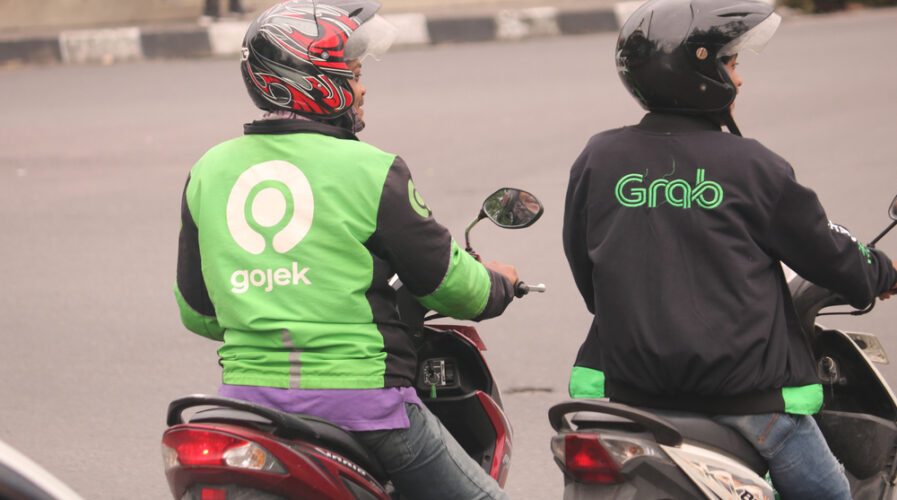
Grab vs Gojek vs AirAsia: Which superapp reigns in Southeast Asia?Source: Shutterstock
Grab-Gojek merger — a global internet giant in the making
- Grab and Gojek have been locked in a fierce, expensive battle for super app dominance in Asia
- But merger talks have been ongoing in parallel, and “substantial” progress has been made towards consolidation
- Although talks are still fluid, governments may have antitrust concerns about the unification of the region’s two leading ride-hailing companies
Even before the world got hit with the pandemic, Southeast Asia’s two largest ride-hailing firms Grab and Gojek had been discussing a potential merger. The economic fallout of Covid-19 has forced these apps to reconsider their plans for ongoing expansion, and thoughts have returned to consolidation.
SoftBank’s Masayoshi Son has been pushing for a merger between the two super apps and, according to Bloomberg, the two companies have made “substantial progress in working out a deal to combine their businesses.”
Now, if the merger comes through, the two companies will operate as one entity that would apparently be headed by Grab co-founder Anthony Tan. The Gojek brand, however, will be retained in Indonesia, and the new entity will be run by Gojek executives in the country. The report says that Grab and Gojek may still operate separately “for an extended period of time,” as the merger’s end goal is to become a publicly listed company.
The two companies have so far refused to comment on the matter, with neither issuing official statements as of the time of writing. If merged, the two groups would form one of the world’s most highly-valued startups. Currently, Grab, and Gojek is valued at US$14 billion and US$9 billion respectively.
The dynamics
You may recall that back in 2018, Grab officially acquired Uber’s entire operations in Southeast Asia, effectively driving out the Silicon Valley-based company’s presence in the region. Grab is present in eight countries while Gojek has a presence in Indonesia, Singapore, the Philippines, Thailand, and Vietnam.
Gojek, which was launched in Indonesia back in 2015, has a business model similar to that of Grab. Gojek also provides motorcycle taxis, food delivery, courier, and e-wallet services, and it has already established a name for itself in countries where it’s available. It remains to be seen how Grab and Gojek’s operations will change if and when this new deal is finalized. This merger could potentially change the ride-sharing landscape across Southeast Asia.
Investors have been pushing for them to combine forces across the region in order to reduce cash burn and create one of the most powerful internet companies in the region. In fact, SoftBank has been pushing for a deal since Son visited Indonesia in January, but he’s grown increasingly frustrated with the lack of progress. The old rivalry and personality clashes between the two companies’ leaders have led to deadlocked negotiations in the past, according to one of the people familiar with the talks.
Sources are claiming both Grab and Gojek have made substantial progress in working out a deal to combine their businesses in what would be the biggest internet merger in Southeast Asia. Apparently, the region’s two most valuable startups have narrowed their differences of opinion, though some parts of the agreement still need to be negotiated.
The final details are being worked out among the most senior leaders of each company with the participation of SoftBank’s Son, one of the people told Bloomberg. Under one structure with substantial support, the two brands may be run separately for an extended period of time. The combination is ultimately aimed at becoming a publicly listed company. Among the hiccups to the deal would be the need for regulatory approval on top of the antitrust concerns by governments about the unification of the region’s two leading ride-hailing companies.
Tough year
Despite recent growth, the economic fallout of Covid-19 didn’t miss the two tech giants, which both had to reorganize operations and close some low-profit services. Gojek announced in June that it would lay off 9% of its workforce and close GoLife, which offers household cleaning and on-demand massage services, and GoFood Festivals, the arm that operates physical food halls.
The decision came on the heels of Grab’s decision to lay off 360 employees – around 5% of its workforce – and an announcement that it will close some “non-core projects”. In an analysis published in late June, Fitch anticipated that the companies may also look to reduce spending or disband operations in the hotel booking and ticketing segments if sustained economic pressure continues.
But while the companies are pulling back from certain segments, Fitch expects them to “refocus resources into three core businesses: ride-hailing, food/grocery delivery, and payments.” In particular, food and grocery delivery services have proved to be big winners in the pandemic, with demand increasing significantly as consumers sought to adhere to social distancing guidelines and avoid crowded supermarkets.
Even financial services are expected to play an increasingly important role in the plans of super apps moving forward. After introducing GoPay and GrabPay to process payments for ride-hailing bookings, both Gojek and Grab have rapidly expanded their financial services into point-of-sale and online payments, as well as ride insurance for its riders and drivers, travel insurance, and business loans for small and medium-sized enterprises.
READ MORE
- Global concerns rise over alleged cyber hacking activities linked to China
- China’s new tech policies challenge Intel and AMD in a shifting landscape
- Saudi Arabia could become the largest player in the AI industry
- How vulnerable are we to cyber threats in the digital age? Here’s what IBM found
- Wise: Revolutionizing travel and finance in Malaysia


